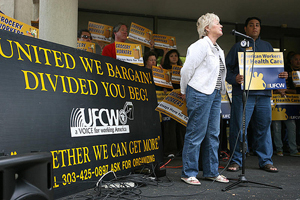Updated and corrected December 16
One of Colorado’s major grocery chains received an early holiday present this year: a concession-filled contract, rammed through by the United Food and Commercial Workers International over local objections.
Though UFCW Local 7 held meetings to inoculate workers against the contract, it was voted up December 14 by workers at King Soopers, a Kroger chain, in a mail ballot. Grocery workers at Safeway in Colorado rejected the deal, however, and local leaders hoped to return to the table. Their leverage has been diminished by the split vote, though, and Safeway is expected to exert heavy pressure to get the same deal as its competitor.
In six months of negotiations by statewide UFCW Local 7, workers rejected concessionary contracts and authorized a strike three times. But the UFCW International swooped in, denying strike sanction for the local’s 17,000 workers at Safeway and King Soopers. The International president said “amicable means” for resolving the contracts must be exhausted.
What’s more, Colorado’s Governor Bill Ritter—elected with support from the local—said he would deny unemployment benefits in the event of a lockout by the grocers.
Needless to say, the odds were stacked against the local.
TWO-TIER BECOMES THREE-TIER
Workers said the International’s actions were reminiscent of 2004, when officials interrupted a strike vote meeting and forced a mail ratification ballot.
Matters were complicated by a local leadership in disarray. Members voted out the Local 7 leadership in September after disclosures of nepotism, inflated salaries, and misuse of union funds. The ousted leadership is still in power until January 1 but the incoming president made no public statement about the contracts and was absent from negotiations.
Grocery workers know the supermarkets’ pleas of poverty aren’t real—Kroger is projecting a $1 billion profit in 2009 and Safeway says it’ll make at least $915 million, as people spent less money in restaurants.
But still the chains demanded workers’ sacrifice. Future pension accruals will be cut by up to 60 percent. Members now face another five years of a two-tier contract that has turned more than half the membership into a second class of workers. All new hires will enjoy less vacation time, start at minimum wage, and endure a longer wage progression. Some will wait longer for health insurance; some will wait less. A third tier for baggers was created; they won’t get health insurance for three years and will remain at minimum wage forever.
LEVERAGE SQUANDERED
The local had prepared for a strike because the corporations had made no substantial improvement to their offer since May. Dozens of lost-timers were pulled out of stores and sent around to hold meetings, talk to members at the workplace, and explain the contract proposals. Members wore stickers with pictures of lips to highlight the lip service management was paying to their needs.
Workers had hoped to use their leverage around the holiday shopping season by threatening a strike just before Thanksgiving. In October Safeway and King Soopers workers voted to strike. Local leaders requested the final strike sanction promised by the International one month prior.
On October 20, 200 workers came to bargaining in a hotel ballroom. Local 7 has a tradition of rank-and-file participation throughout bargaining. Negotiations are open to workers and decisions are made by majority vote.
Workers pleaded with the companies for a last, best, and final offer by telling their stories, yelling, and crying. Company bargainers eventually walked out. At that point, workers turned their attention to Kevin Williamson, an International vice president, and demanded strike sanction. Williamson promised it in the next few days.
Leaders and members knew that if they didn't get sanction before Thanksgiving, their leverage was shot: grocery stores are slow after holidays. There was a sense of tremendous urgency to finalize a fair contract.
On November 6, the International said strike sanction would not be granted and implied it would take over talks. A local that strikes without sanction is subject to trusteeship, and the International had threatened the local with trusteeship for weeks.
The grocery chains, facing no threat, were in no hurry to bargain further. An internal email surfaced from King Soopers’ human resources department stating there was no threat of a strike—concluding that Local 7’s preparations for one were only “saber rattling.” Many workers were angry when it appeared that King Soopers knew about the lack of strike sanction before the local did.
BEEN HERE BEFORE
Grocery workers in Colorado find themselves in a familiar place. Five years ago, they were also dragged through months of negotiations with almost no movement by the corporations. The International UFCW eventually stepped in and continued to bargain without the participation of the local or its members.
Local 7 leaders pushed hard to reject the disastrous two-tier offer that emerged, but members accepted it. Instead of using Local 7’s usual voting method, with tallies held at member meetings, the International stopped the last round of votes from taking place and sent ballots in the mail. A majority of workers didn’t vote.
Local 7 could be what the Change to Win federation promised at its 2005 creation: a strong, high-density union focused on building power in its industry. Local 7 has the density but has been disempowered by the International, leaving it unable to use its power to win good contracts.
Corrections: Not all new hires will wait longer for health insurance, and not all would start and remain at minimum wage. Only some will, including "courtesy clerks," who bag groceries, corral shopping carts, and do related tasks at the front of the store. Other workers will start at wages as defined by their classification and experience.
Ric Urrutia is a former rep and Amy Rosner a former deputy secretary with UFCW Local 7.







